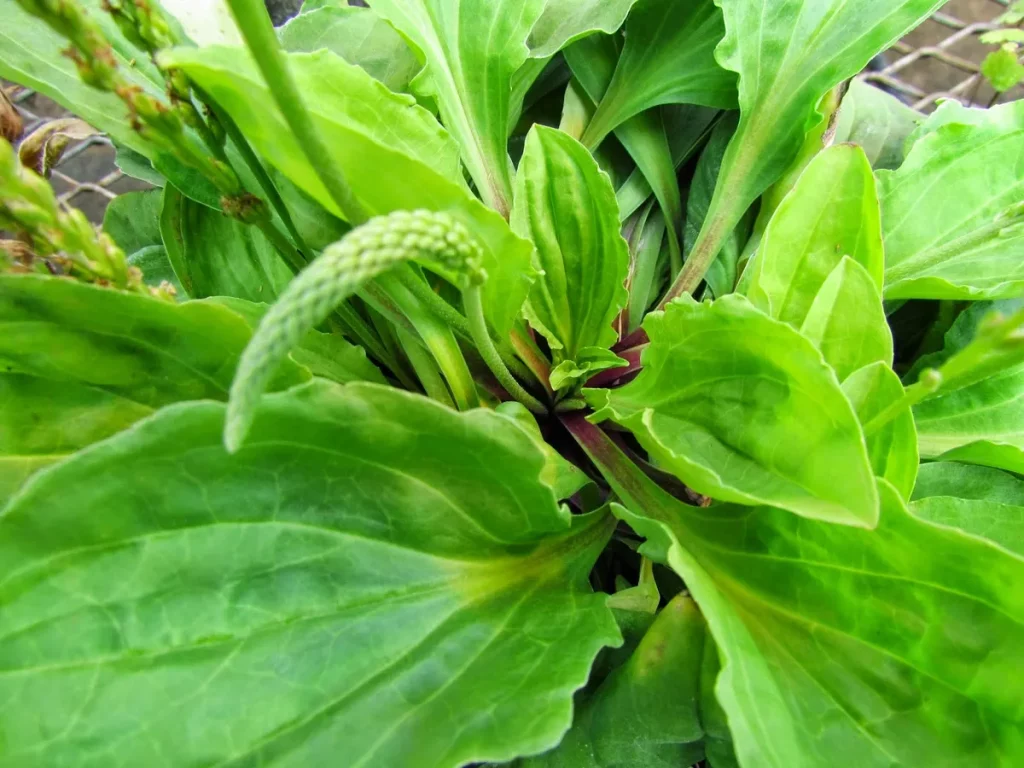Broadleaf Plantain
Plantain (Plantagosp.) is a large genus of plants with over 200 different species. Two of these species are commonly used medicinally: Plantago major and Plantago lanceolata.
Native to Europe and parts of Asia, plantain was likely brought to North America by early settlers from Europe. Now, it can be found growing pretty much everywhere: backyard gardens, pastures, freshly tilled areas, sidewalk cracks, etc.
You can easily harvest plantain leaves from the wild as long as you are sure there hasn’t been any pesticide use nearby. Once you know what to look for, plantain is fairly easy to identify.
The plants grow in unassuming rosettes. Their leaves are green and oblong (sometimes rounded) with ridges running vertically up each leaf. The flower stalks are plantain’s most characteristic feature but will not be present year round.
The youngest leaves will be the most tender and have a high nutritional value. They can be eaten like greens in salads, soups, etc. More mature leaves typically contain a higher concentration of beneficial medicinal compounds, but leaves get tougher and stronger in flavor the older they are.
Plantain leaves have been used by many different cultures as a remedy for coughs, colds, wounds, skin conditions, and more. Their anti-inflammatory, wound healing, and anti-infective properties have been confirmed in studies. (1)
Benefits of Plantain Leaf
Healing for Damaged Skin

One of the greatest benefits of plantain leaf is its ability to help damaged or infected skin heal.
Earning the nickname “Healing Blade,” plantain was once used in Scotland to stop blood flow and heal tissues from sword wounds. It was also valued by the Native Americans for treating stings, burns, rashes, and wounds. (2)
Modern herbalist Rosemary Gladstar calls plantain a “poultice herb supreme”. Its fresh leaves can be mashed and applied directly to insect bites and stings, burns, skin eruptions, and wounds. She also recommends using plantain alone or with an herb like yarrow on wounds that are still bleeding to slow or stop the flow. (Rosemary Gladstar. Medicinal Herbs: A Beginner’s Guide, pg. 189-190)
The wound healing and antimicrobial nature of plantain leaf has been confirmed in several studies. (1)(3)
Plantain also contains a substance called allantoin that is highly beneficial for soothing skin and promoting new cell growth. This, along with its anti-inflammatory properties, makes a poultice or infusion of the leaves good for calming sunburn, acne, and other types of skin inflammation.
If you don’t have access to fresh plantain (or it’s the wrong season), try this Super Salve containing plantain leaf for all kinds of skin distresses.
Draws Out Toxins
Plantain leaf is unique among herbs because of its ability to draw out toxins from your skin and body. It was once used to draw out venom from snake bites and other animal and insect bites. Its drawing action can also be highly effective on stings, whether from an insect or a plant like stinging nettle.
You can even use a plantain poultice to draw out a deep splinter. Gladstar recommends soaking the area of skin in hot plantain tea, then keeping a poultice on until the sliver can be pulled out. (Gladstar, pg. 189)
When taken internally, plantain leaf has similar benefits by drawing toxicity out of your body. It’s considered a blood purifier and stimulates your liver to cleanse toxins out of your blood and body.
Promotes Respiratory Health
Another traditional use for plantain leaf was to ease coughs and other types of respiratory problems. The leaves contain a good amount of mucilage, which helps to soothe, moisten, and protect the throat and respiratory system.
The German Commission E (an organization similar to the FDA) has approved the use of plantain for coughs and other infections of the upper respiratory system. A few studies done in Bulgaria have indicated that it can be effective for chronic bronchitis. (4)(5)
Nutrient Rich and Immune-Boosting

Plantain leaves are packed full of vitamins and other nutrients. They are especially high in vitamins A and C, which can boost immune health, and also contain calcium and various minerals.
Apart from benefiting your immune system, plantain is also one of the best “emergency” foods. Because it is nutrient dense, easy to harvest, and prolific, plantain leaves can be used as a food source and enjoyed in many different dishes.
Promotes Liver and Digestive Health
The many benefits of plantain leaf extend to your liver and digestive system. It can help with poor digestion by stimulating your liver and assists the liver in getting toxins out of your body.
The anti-inflammatory and demulcent properties of plantain make it very soothing for your digestive tract. It’s thought to help with many types of digestive complaints, including diarrhea.
A third species of plantain (Plantago ovato) is where psyllium comes from. Psyllium is a popular dietary supplement used to treat mild constipation and promote regularity. Psyllium husk is a main ingredient in Metamucil, but can also be used on its own as a fiber source to promote healthy digestion.
Ways to Use Plantain Leaf
You can used plantain leaf both internally and externally in fresh or dried form.
The fresh leaves are very powerful, so you may want to see if you can find any growing in your backyard. You can use plantain to make teas, tinctures, salves, poultices, and more.
To make a simple poultice:
- Gather fresh plantain leaves and wash or rinse them off.
- Mash or cut the fresh leaves so that the juices start to come out.
- Apply the mashed herb directly to skin and place a thin cloth over it. You can wrap a bandage around the cloth to hold it in place.
- Leave on for at least 30-45 minutes. If the herbs turn black, discard them and apply a fresh poultice.
Plantain leaves are also available in dried form and as ready-made tinctures and capsules.

